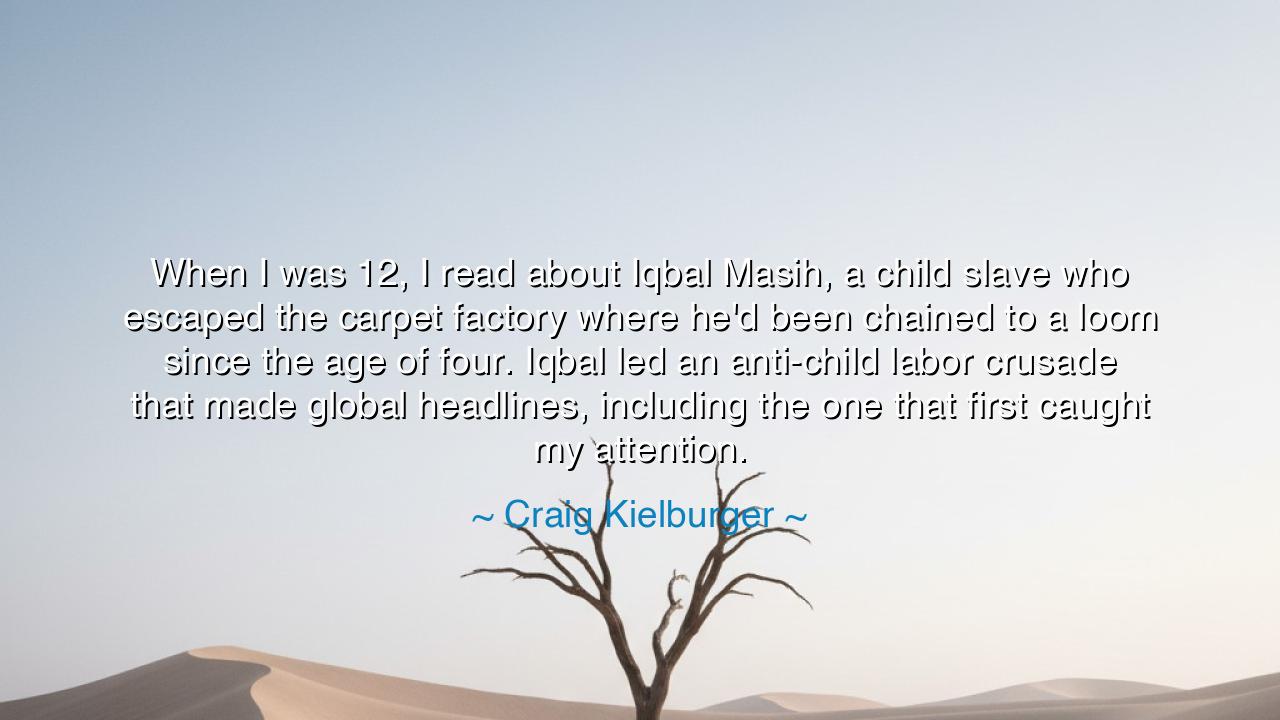
When I was 12, I read about Iqbal Masih, a child slave who
When I was 12, I read about Iqbal Masih, a child slave who escaped the carpet factory where he'd been chained to a loom since the age of four. Iqbal led an anti-child labor crusade that made global headlines, including the one that first caught my attention.






Harken, O children of the future, to the words of Craig Kielburger, a man whose journey of compassion and activism was inspired by a story that would shape not just his life, but the course of his purpose. He said, "When I was 12, I read about Iqbal Masih, a child slave who escaped the carpet factory where he'd been chained to a loom since the age of four. Iqbal led an anti-child labor crusade that made global headlines, including the one that first caught my attention." These words carry the weight of a profound awakening, an awakening to the injustices of the world and the power that even the youngest among us can possess to stand against them.
In the ancient world, the struggle for freedom was often seen as the highest of human pursuits. The Greeks celebrated the idea of liberation from tyranny, both external and internal, through their great tales of heroism and defiance. Socrates, though often portrayed as a humble philosopher, was himself a freedom fighter of sorts. His defense of the individual soul and the pursuit of truth in the face of societal norms was an act of resistance, one that questioned the very foundation of authority. In much the same way, Iqbal Masih’s story is one of profound resistance—a young boy, bound by chains both literal and metaphorical, who challenged the systems of power that sought to oppress him and others like him.
The story of Iqbal Masih—a child slave, chained to a loom for years—echoes the cries of countless individuals who have been enslaved by systems of injustice and exploitation throughout history. His courage in the face of such oppression serves as a shining example of bravery, a reminder that even the most vulnerable among us can rise up against tyranny. At the tender age of four, Iqbal was bound in chains, forced to work in conditions that stripped him of his innocence, yet his spirit could not be broken. By the time he was twelve, he was already a hero in the eyes of the world, leading a crusade against child labor, a fight that would inspire millions and bring global attention to the suffering of children in forced labor.
Let us look to the example of Spartacus, the gladiator turned leader, whose rebellion against the Roman Empire became the stuff of legend. Like Iqbal Masih, Spartacus was a symbol of resistance, not just to physical chains, but to the mental and societal chains that kept so many in servitude. He led a slave revolt, challenging the might of an empire with nothing but the raw power of his will and the desire for freedom. Though Spartacus’s fight was ultimately crushed, his story lived on, inspiring future generations to rise against injustice. Iqbal Masih too, though his life was tragically short, became a symbol of hope and resistance, showing that even in the face of great adversity, the human spirit can prevail.
What Iqbal Masih and Spartacus remind us, O children, is that age does not define the power of the individual to challenge the forces of oppression. At twelve years old, Iqbal achieved what many adults never do in a lifetime: he challenged the status quo and fought for the freedom of others. His story teaches us that no matter how young, we each possess the power to take a stand, to raise our voices, and to demand justice. Just as Iqbal led an anti-child labor campaign, each of you, too, has the potential to lead in your own way, to take up the cause of those who cannot yet fight for themselves, and to make a difference in the world.
The lesson of Iqbal Masih is clear, O children: freedom is a gift that must be protected, and each of you must stand as a guardian of it. Age does not dictate the scope of your impact; your courage, your compassion, and your resolve are what will shape the world. Do not wait for the world to change on its own; you must lead the change. Iqbal’s story calls us not just to recognize the injustices that exist but to act on them. He showed us that even the smallest voice can make a loud cry for justice, and even the youngest can stand as a warrior against exploitation.
Therefore, O children, let the example of Iqbal Masih guide your actions. Look around you and see where injustice thrives—whether it is in the exploitation of children, the oppression of marginalized communities, or the destruction of the planet. Then, take action. Speak out, rise up, and use the power of your voice to challenge the forces that seek to enslave others. The world is in need of more heroes, and you are capable of becoming one. Like Iqbal, let your courage be your weapon, your voice your banner, and your heart your guide.






AAdministratorAdministrator
Welcome, honored guests. Please leave a comment, we will respond soon